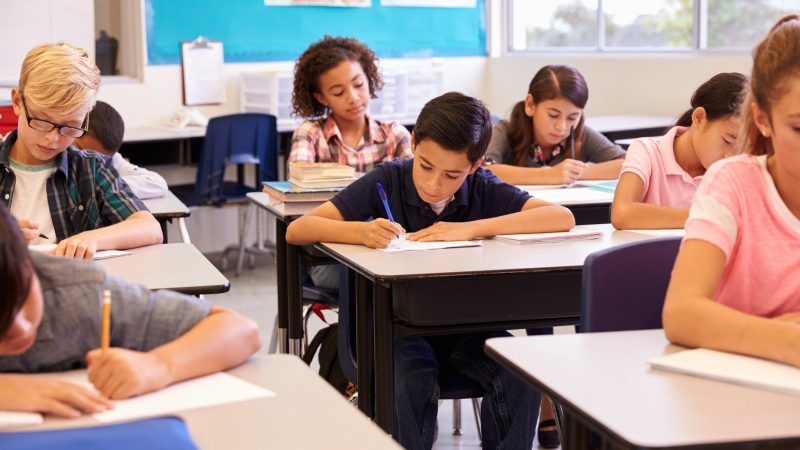What Are the Prospects for School Choice Gains in 14 States?
If passed, new laws will give parents more control over how their education dollars are spent.

Fourteen states are considering bills that would allow government funding to follow students wherever they are being taught, giving parents more freedom to choose schools for their kids.
This legislation would permit a portion of the funding that would otherwise go to a student's assigned public school to be used for private tuition as well as for tutoring, textbooks, special-needs therapy, and other approved education expenditures.
The likelihood of these proposals becoming laws varies greatly from state to state, says Corey DeAngelis, director of school choice at the Reason Foundation, the nonprofit that publishes this website. The state legislatures of New Hampshire, Georgia, Missouri, Indiana, Nebraska, Virginia, Washington, Oregon, Iowa, North Dakota, Oklahoma, Arizona, Kentucky, and Kansas all have such bills pending. (More here.)
States with Republican-controlled legislatures, such as Missouri and Iowa, are typically more likely to pass school choice laws, DeAngelis tells Reason. Last Thursday, a school choice bill passed 5–4 through the Missouri senate education committee. Earlier this month, Iowa Gov. Kim Reynolds, a Republican, made school choice reform a major component of her annual Condition of the State Speech. Yet DeAngelis is less optimistic about states controlled by Democrats.
"It is not going to be serious in all of the states," DeAngelis says. "For example, Oregon and Washington are heavily blue and blue legislators tend to vote against these measures."
Public school administrators have proven resistant to parting with government funding. On Monday, the superintendent of Westside Community Schools in Omaha, Nebraska, tweeted, "State dollars should NOT be used for non-public schools that don't shoulder the same accountability we do and that don't serve ALL kids."
Teachers unions have also traditionally opposed school choice. Union leaders argue these programs work to the detriment of underprivileged students by siphoning funds from the public system, and some go so far as to disparage parents who choose to remove their children from public school.
"It shouldn't be a partisan issue," says DeAngelis. "School choice leads to more equity by allowing less advantaged families to have access to alternative schools that more advantaged families already have access to."
Research indicates that school choice programs have been overwhelmingly successful in improving student outcomes. A 2019 study by the research organization EdChoice examined three voucher programs and five privately funded scholarship programs across five states. The study found that of "the 16 random-assignment studies examining participant test scores, 11 have found positive outcomes for either the full sample or at least one subsample of students studied." And "three found no visible effect for any group of students, and three found negative outcomes for all or some group of students."
Shutdowns due to COVID-19 have served to bolster the popularity of school choice among voters. "Right now support for school choice is at an all-time high," DeAngelis says. "I think it is because families are seeing that the public school system is just not there for them. Closed buildings are getting to retain their children's education funding."
An August 2020 poll conducted by RealClear Opinion Research and commissioned by the American Federation for Children, a pro–school choice group, shows that 69 percent of those surveyed support school choice, and only 32 percent would select a public school for their child if they had another option. Multiple national polls show that about two-thirds of Americans support school choice.


Show Comments (44)